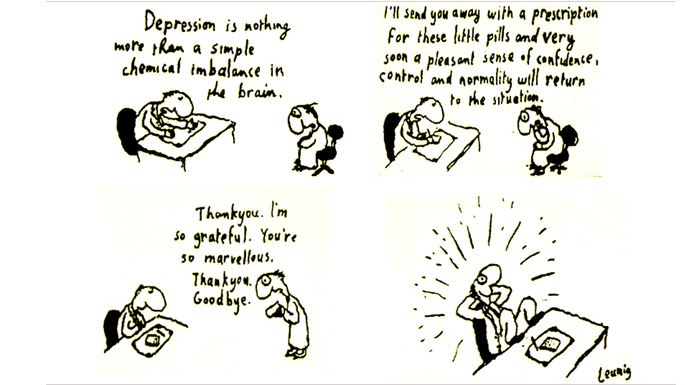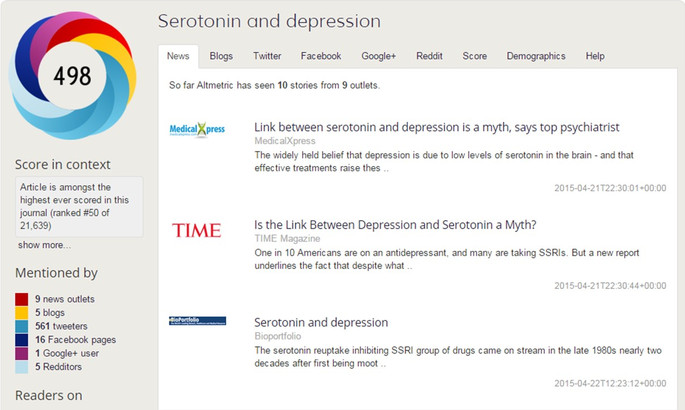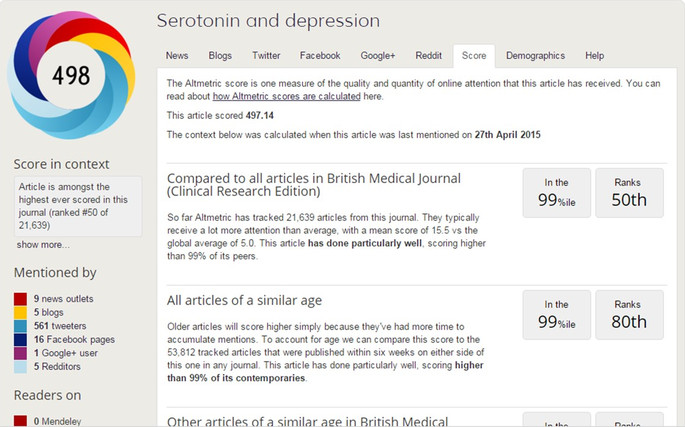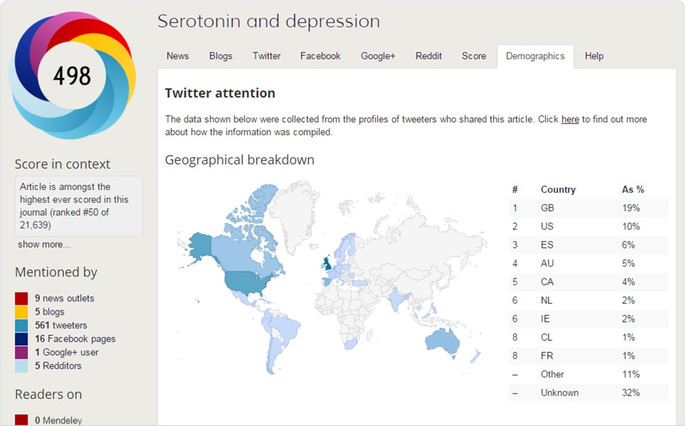
The BMJ article on Serotonin and Depression has stirred some interest. There are some highly technical comments on the BMJ site but of course the key point behind the piece is the rather obvious fact that twenty-five years ago many people were saying it was all a myth. The extraordinary Michael Leunig nailed it twenty years ago in the sketch above. (Leunig is wonderful across the board and razor sharp on medicine and mental health).
So did the BMJ know what they were doing when they sent the article to the Science Media Centre leading to the extraordinary new Switch on Anti-Depression (SAD) theory?
I thought they were making a mistake, but maybe not. The figures for impact from Altmetric show a lot of interest.

There are good grounds for a lot of people to be very angry.
The lawyers for several pharmaceutical companies for instance claim to be very angry and upset by recent posts mentioning that finding out about things such as the idea that lowered serotonin was a myth could provoke murderous fantasies in some people, most of whom would do nothing but simmer and seethe. They have been even more upset at the suggestion that while some of us can view all this as “academic” others might be radicalized and might storm the offices of pharmaceutical companies or journals.
See War on Civilization and Pharmaceutical Rape.

Our rulers are exquisitely aware of the potential for violence in those who are oppressed – those who are powered out. The violence inflicted on us – mostly by White Males – from Ferguson and Charleston to Baltimore playing out across television screens for the last year offers just one example. They expect us to be as violent back as they are to us, and they tend to take pre-emptive action. At the first FDA Prozac and suicide hearings, the Chairman Daniel Casey wore a bullet-proof vest.
Clearly there has been no endorsement here for violent action but as one correspondent (MMC) put it, we sent Marlboro Man packing and something similar is needed here.

Better Die on your Feet than Live on your Knees sounds violent but was in fact the rallying cry of the Non-Violent Resistance movement that began in Ireland in the 1870s with Michael Davitt and later extended to Mahatma Gandhi and Martin Luther King.
If you want to see what is involved, fill a RxISK report on your behalf or someone close to you and take it to your/their doctor. There is a good chance you’ll find out just how violent the system is.
But keep knocking until you find a doctor who listens, let us know about them and we can build networks that can change medicine. It is only going to change from the bottom up.
Out of the 355 comments left by the public on the Daily Mail page, the top comment with the most likes ( well over 500 ) was this
Having seen the inside of 3 mental Hospitals, I tend to agree with him. SSSIs have usually ended up making even more sad and unhappy than I was before. Humans have been trying to analyse their feelings for years, and we probably are just at the start of understanding who we are and how we work. I feel a lot better when I do physical work – like digging my allotment or walking for 10 miles or more – or when I’m chatting with friends. Perhaps we need to re-invent ‘going down the Pub’ and having Gardens again.’
Read more: http://www.dailymail.co.uk/health/article-3050380/Depression-NOT-caused-low-serotonin-levels-drugs-used-treat-based-myth-psychiatrist-claims.html#ixzz3YXr24Xtf
Follow us: @MailOnline on Twitter | DailyMail on Facebook
My comments on there got far more green arrows than red and the majority of people commenting were fed up with being lied to and treated like simpletons by big pharma.
Who cares if the Pharm. Companies are upset. Tell them to “Get Out The Crying towel” Little Babies. Its About Time That This Myth of Lowered Serotonin in Depressed People Got Out Finally. I’d Love To see Someone From Pharma. Push This Issue. The Facts Don’t Lie, But They Don’t like Facts, They Like Pseudo Science And Lying To the Public.
Data Based Medicine @RxISK • Apr 25
1/ Lots of reactions, pro & con, to @DrDavidHealy BMJ article on myth of “low serotonin” — but only one makes the @RxISK crew angry:
Data Based Medicine @RxISK • Apr 25
2/ “Well yes, in general you’re right .. but you mustn’t say that where vulnerable patients can hear.” That is a betrayal of our trust.
HEALY STATES THE OBVIOUS
As a matter of clinical science, these debates about a simple serotonin deficiency in depression ended 45 years ago, when the proposed therapeutic utility of monoamine neurotransmitter precursors was disconfirmed. See PubMed # 4936139 for my summary review. There have been major missteps in the intervening years – for starters, the foolish introduction of generic major depression in lieu of clinically differentiated types of depression as the focus of investigations; the displacement of disinterested clinical science by corporate experimercials; the corruption of key opinion leaders who promoted corporate marketing narratives; and the regulatory capture of research funding and regulatory agencies by commercial forces. The discomfort that David Healy’s editorial in BMJ caused reflects a general embarrassment at the emptiness of current research in mood disorders. The yield has not been commensurate with the billions of dollars thrown at the problem – to the point where most corporations have exited the field out of a healthy self-interest. Little wonder, then, that the movers and shakers and wannabes are now throwing the book at Dr. Healy for stating the obvious.
Bernard Carroll.
It is only going to change from the Pits Up.
I never thought I would see the day when the ‘patient’ turns on their ‘record’ button on their phone, in their pocket, to ‘record’ all those little ‘asides’ which never reach that legal document vacuously called ‘Medical’ Records.
The world has moved on from ‘vinyl’ but does not desist from ‘venal’.
Akathisia is poorly understood even when the patient is flapping around like a seagull with one leg trapped…
The billion dollar question “shall we release the bird or kill it” and this is the question that GlaxoSmithClean might like to answer.
I read the reply in the SMC and it didn’t make sense on the whole.
My reply to what the Royal College of Psychs spokesman said is a simple one.
There is a reason for the “well worn path” that you so patronisingly use as a metaphor for David Healy’s persistence on the issues surrounding SSRIs.
The path is well worn because the medical profession arrogantly refuse to listen to patient experience, under report side effects and ignore reports of dependency and withdrawal.
You may be bored of hearing the arguments put forward, but as patients we are gathering momentum and we back Professor Healy. He may say the same things and you may find this tedious, but as patients we find it reassuring and helpful that someone in the world of medicine actually listens.
Instead of putting him down, maybe you should give that a try?
I totally endorse your comments Polly …… and Patient Power has to rise up, make it’s voice heard loud and clear and OUT this prolonged, Pharm Companies tragic scandal
Patients don’t go to their doctors for debates. They go hoping for sound advice and help. If the “debates ended 45 years ago”, promotion of the theory, presented as fact to patients, has not ended. Fact.
Recently, after almost three decades trapped in the system and having fallen foul of David Healey’s very well described Stockholm Syndrome I had a Eureka moment. I had not yet ever heard of Critical Psychiatry. What if it were the drugs that were causing increasing physical ailments? In fact what if it were the drugs that had caused the increasing mental instability over the years gaining me numerous diagnostic labels?
I started writing down my thoughts as I tapered down and finally became drug-free. The ensuing neurostorm was swiftly treated with a dose of neuroleptics. My attempts to explain the effects of the drugs over the years earned me yet another dubious symptom: “circumstantial thinking” and yet again a summary discharge.
The Bottom Up approach will not succeed as long as the “experts” refuse to drop their preconceptions about their patients and refuse to listen.
During my Enlightenment I wrote (with a touch of artistic licence):
The clinicians blame my ‘relapses’, ‘erratic behaviour’, and ‘instability’, poor response to ‘medication’ on my ‘illness’ or ‘personality’ (depending on the cultural climate or convenience) and respond by adding more ‘medication’ and more psychiatric labels.
When I say I’m more unstable after 25 years of ever-changing treatments and drugs than I was in the 2 decades of relative normality before meeting Professor Psychiatry, the doctors say it’s ‘disease progression’;
When I say that the drugs have changed me and made me worse, the doctors say it’s ‘denial’, ’lack of insight’;
When I say the System, with its dubious, patchy and ever-changing treatments and drugs, has killed me, the doctor’s say ‘delusional’;
When I explain what treatments and drugs have been used on me, which I have willingly accepted and believed in, over the last 2 decades, the doctors describe me as ‘hostile’, ‘argumentative’, with ‘circumstantial thinking’;
When I say I have no faith in Psychiatry, diagnostic labels, drugs, the doctors write ‘persecution complex’.
Thank you David Healey for your persistence.
Dr. Chris Steele should have his utube video on depression removed.
Just another Doc who believed in the serotonin theory.
The article is now ranked 43. So let’s show DH the support he deserves FB, Twitter and Google + users and share, share, share. Make sure share setting is on public for Facebook share. I usually have my setting for friends but changed it just for this post. You can change it back after. I think they only count it on the altmetric score if it’s shared publicly.
Let’s get this to the highest ever scoring article in BMJ.
It’s now 41 on the BMJ altmetric score. Keep sharing its one in the eye for all those who try to discredit DH. I’ve managed to get some friends to share and I’m sharing and commenting all over the place. Share on FB, make sure the setting is public, Google +, twitter, blogs.
Hi. It does feel like momentum, since Germanwings, then BMJ, and Lie-brrrr-mam calling Whitaker a menace.
Btw way the “well-worn-path” that was “out of date?” That is almost a mixed metaphor, and certainly awkward; evidence of inadequate education and disinclination to read well-written books.
Another very interesting article out today.
Pharmaceutical industry regulation undermines NICE drugs appraisal work
Caroline White
Wednesday, 29 April 2015
The system for pharmaceutical industry regulation lacks accountability, is not evidence based, and undermines the drugs appraisal work carried out by the National Institute for Health and Care Excellence (NICE), argue health economists in the Journal of the Royal Society of Medicine
Professors Alan Maynard and Karen Bloor, of the Department of Health Sciences at the University of York, say the technology appraisal work carried out by NICE, has been a target of pharmaceutical industry hostility since it was established in 1999.
They highlight the evaluation of end-of-life products such as cancer drugs. In 2009, NICE was instructed to increase the threshold of the cost: QALY ratio (where a QALY is one year of good quality life) for these drugs from £30,000.
If a product is shown to produce a QALY for an acceptable cost, NICE approves it for use in the NHS and commissioners are obliged to fund it.
Provided firms do not exceed regulated rates of return on historical capital set out in the Pharmaceutical Price Regulation Scheme agreements, they are free to set their own prices.
“This system is inflationary and has added billions to NHS costs since 1999, partly because the cost-per-QALY threshold is relatively high, contentious and is not evidence-based,” say the economists.
Also singled out for criticism is the Cancer Drugs Fund, which allocates £280 million a year to cancer drugs not approved by NICE on a case-by-case basis.
The Coalition government renewed and increased the Cancer Drugs Fund to serve two political goals: the garnering of votes from public interest groups and the subsidisation of the pharmaceutical industry, they say, describing the Fund as an unfair and inefficient scheme.
“It is inefficient because pharmaceuticals are financed regardless of whether they meet an appropriate cost-QALY threshold, subverting NICE processes. It is inequitable because it discriminates against other diseases which may be equally in need of additional funding,” they write.
To illustrate how policy may support the pharmaceutical industry at the expense of the NHS, the authors point out how switching patients with age-related macular degeneration from one drug to another very similar drug that is licensed for the treatment of colorectal cancer could save the NHS in England £100 million each year.
However, licensing issues and the threat of legal challenges from the pharmaceutical industry are thwarting NHS commissioners seeking greater efficiency in the use of their constrained budgets, they contend.
They suggest that: “Government continues to subvert the efficiency of technology appraisal work carried out by NICE in order to subsidise industry.”
And they ask: “Does this benefit the UK taxpayer and NHS patients? Or does government tacitly wish to tax the NHS with high pharmaceutical prices of sometimes inefficient drugs and, in so doing, increase the wealth of industry?”
* Alan Maynard and Karen Bloor. Regulation of the pharmaceutical industry: promoting health or protecting wealth? J R Soc Med April 28, 2015 0141076814568299
If you really were concerned about patients wellbeing you wouldn’t discuss such things publicly but only in right place for it – in academia. I hope you will be ripped from your medical license as you pose significant risk for always necessary client trust in doctor.
?? I’m not sure I understand ? Who has posed a risk to client trust ? Surely you cannot mean Dr Healy ??
Why should the information about drugs that are prescribed to patients only be discussed in acedemic circles. Surely the public who are the patients who take the medication have the right be in on the discussion. Are you really saying that all the thousands and thousands of patients who were prescribed SSRI’S on the understanding that it would correct their depleted serotonin levels don’t have a right to know that it wasn’t true ??
Maybe if you weren’t so worried about doctor’s untrustworthiness being exposed, you might appreciate the work of a doctor who has also broached the untrustworthiness of academia — all in the line of duty to the safety and well being of patients.
What prevents all doctors from becoming trustworthy? That has been the stubborn obstacle that has forced me into early retirement — don’t want to entrust my license to the practices I have witnessed , performed by the very doctors who desperately wish Dr. Healy would shut up!
Dirk, don’t you realize that “paternalistic” attitudes like yours (especially from those who have nothing remotely resembling a parent’s dedication to our wellbeing!) are precisely why so many of us CAN’T trust our doctors? Why would we trust someone who blandly declares it’s his responsibility to shield us from the facts whenever he decides this is “for our own good”?
It appears most psychiatrists have become comfortable with selling patients a chemical-imbalance myth that they ceased to take seriously long ago. It would be bad enough if this were merely keeping us ignorant. From what I’ve seen (and I don’t think I’m alone) it’s also making us sicker:
1) Patients who don’t respond to an initial SSRI are often given another SSRI – and then a third, or perhaps an SNRI variation. If that doesn’t have them feeling better, they are told they have Treatment Resistant Depression (and possibly Bipolar Disorder as well), and are much more ill than they previously imagined.
2) Once stuck in this Treatment-Resistant category, they usually end up on a cocktail of antipsychotics, anticonvulsants, stimulants, tranquilizers, etc. If the depression itself has not been disabling, they may end up unable to work due to the sedation and other side effects of their meds. Their lives increasingly revolve around their “treatment,” while recovery slips ever further away.
3) Patients are often told there’s nothing we can do to get better on our own – at least not until the right meds are found. “It’s not a matter of will power,” is perhaps meant to make us feel better, by assuring us we’re not to blame for our “disease.” However, it also disempowers us as we’re left to passively await the next miracle drug which is always just a year or two away.
Most of those who administer this dismal system are nice people with a subjective desire to do good. Telling “encouraging” lies to their patients makes it easier for them to tell themselves that they are doing good, even as patients stagnate or get worse all around them. It also allows them to be harnessed to the agenda of an industry that sees them as tools and their patients as profit centers.
In order for a nice man to fit comfortably into a harmful system, he usually must convince himself that those being harmed are not quite adults or equals, not quite like himself and his colleagues. He can then believe they must be content with a life a person of his own caliber would find unbearable. “Our Negroes were always happy, until you outside agitators came to stir them up! If you were really concerned, you’d keep that talk of freedom for those who can handle it …”
Hi Dirk,
What is the root cause of hostility? The biological hypothesis is a chemical imbalance. The psychodynamic one is that what Dr. Healy says challenges notions people hold dear. The chemical one says psychiatric drugs causing it.
I disagree with everything you wrote.
“If you really were concerned about patients wellbeing you wouldn’t discuss such things publicly but only in right place for it – in academia. ”
Why suggest Academia as a place for discussions of adverse drug effects? Academics run the fraudulent clinical trials that let a mere nightmare manifest as a brutal epidemic. This is doctor Healy’s blog; he can discuss whatever he likes.
The unpleasantness of psychotropic drugs’ side effects, the horrors of physical dependency, and the misery and hospitalizations that follow discontinuation are not discussed in academia or doctor’s offices.
Patients rarely find out how bad it can be until it happens to them. Then, any former benefit of the drugs is outweighed by months and years of physical and psychic hell.
Some people will never have sex again. Some cannot leave their houses. Some have seizures. Some lose control of minds that had caused no problems before psychotropic drugs altered them. The drugs don’t just come and go like waves on a beach. They change the physical structures of the brain.
Some visitors do not believe the evidence Dr. Healy presents here, but no one has refuted it.
Those who do believe it are reassured and comforted to discover that the only thing wrong with them for the last few years or more has been the presence of harmful chemicals in their brains and bodies.
Occasionally, angry people stop by, gnashing teeth and lacking coherence. If they are not incensed when they get here, they might be by the time they retreat. More than a few of us wonder if those people are on Paxil or Effexor.
“I hope you will be ripped from your medical license as you pose significant risk for always necessary client trust in doctor.”
Trusting doctors can be lethal. Many die of the condition, and many of those here came close to dying and are now physically disabled.
Healy’s work might reduce patients’ trust in their doctors, but it is more likely to reduce their trust in antidepressants. Doctors who read his reports might wise up, set aside their prescription pads, and earn their patients’ trust as a result.
Best of luck.
If the academics disappeared we might get somewhere.
If the KOLs disappeared we might get somewhere.
If the journals disappeared we might get somewhere.
If Psychotropic drugs, mishandled by belligerent and ‘hissing’ fit practitioners disappeared we might get somewhere.
The menace of society is laid bare here in this SICK film gloriously enacted by an actress who has been through the system and come out the other end and I think most of us can relate to her.
Her one-woman show…
https://www.youtube.com/watch?v=TRIv1Vlc3Wk#t=15
With thanks to Bob F. for wonderful casting……….
http://www.theguardian.com/society/2015/may/12/psychiatric-drugs-more-harm-than-good-expert
Wish there was a like button here !
Christine, in the absence of a Like Button, Like duly noted and much appreciated – in this ‘difficult’ and ‘challenging’ patient ‘Likes’ (with or without buttons) are proving more clinically effective than all previous evidence-based therapies and drug treatments (“grinning, winking smiley face”)!
“Its only going to change from the bottom up”
As I wrote on another of these threads a few days ago – I only started finding out about all this BigPharma corruption re: the drug I have been prescribed (Seroquel XR – for, as I claim it to be, a wrong diagnosis of Bipolar 2) just 7 days ago.
Happened to have my 3 monthly meeting with consultant psych today – and boy, did I enjoy imparting to him my new found knowledge !!! (wished I’d video’d it all – there was a trainee observer in there – he looked dumbfounded !!)
So, I reckon I am “at the bottom” (ie. a victim, SSRIs (various) then Quetiapine – wrongly diagnosed, wrongly prescribed) and, being at the bottom and recognising the validity of the comment “its only going to change from the bottom up”, I ask what exactly can I do to help spark the revolution that is urgently needed…….
Can we get the FBI in ? !! – seems they’ve sorted out FIFA (headline news today 27.05.15) BUT are they tough enough to take on Big Pharma?
I know this blog focusses on SSRIs, but for the likes of me whose “progression” went from SSRIs (various) to the anti-psychotic, Quetiapine (i.e. Seroquel XR “pushed” by AstroZenica) for mis diagnosed ‘bi-polar 2’, the following link is very interesting and relates to a lawsuit (Oct 2014) – State of Texas v: AstroZenica and resultant resignations of corrupt psychiatrists:
http://blogs.wsj.com/pharmalot/2015/04/21/psychiatrists-with-ties-to-astrazeneca-resign-from-texas-hospital/
Why aren’t our health authorities similarly suing for vast amounts of mis-spent public money?
RESPECT to the State of Texas !!!!
Dr. Healy,
Please check:
http://archpsyc.jamanetwork.com/article.aspx?articleid=2319711
http://archpsyc.jamanetwork.com/article.aspx?articleID=2319710
http://www.medicaldaily.com/social-phobia-linked-high-levels-serotonin-time-rethink-ssris-and-other-anxiety-drugs-338608
Déjà vu?
http://www.nybooks.com/articles/archives/2009/jan/15/drug-companies-doctorsa-story-of-corruption/
It’s very heartening to hear more people holding these cranks to account.
It’s shocking the way they tell their patients that they have biochemical deficit of serotonin which an SSRI can fix.
They’re shameless. Utterly shameless.
Why is it that (most) psychopharmacologists are the ones most critical with SSRIs and (big pharma sponsored) clinical trials?
http://psychotropical.info/why-most-new-antidepressants-are-ineffective
Probably because, unlike psychiatrists, they know better the drugs they use.
Thanks Dr. Healy.